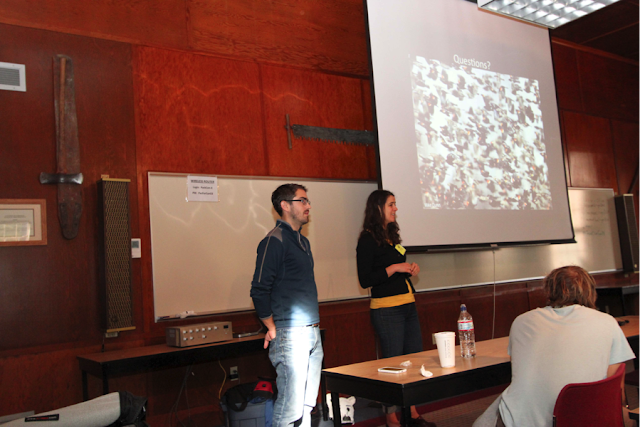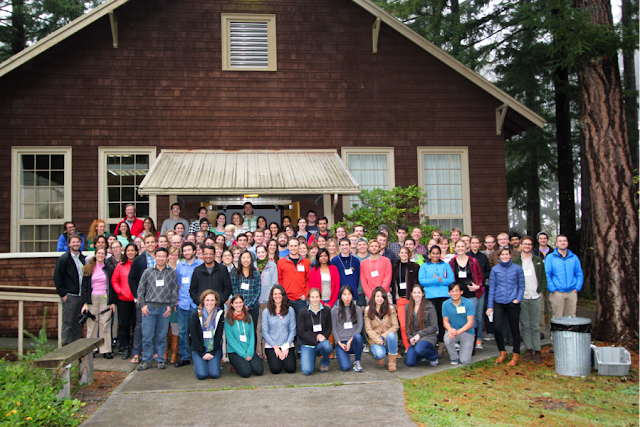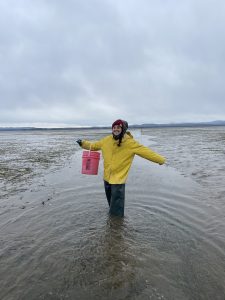Ocean chemist, meet atmospheric dynamicist; Salmon biologist, meet environmental lawyer. Now that we’re all friends, let’s get started.
I recently had the opportunity to help organize the Graduate Climate Conference. The meeting is a competitive-entry, grad student only conference created by UW students and hosted in alternating years by UW and the Massachusetts Institute of Technology- Woods Hole Oceanographic Institution. This opportunity to interact with grad students from distantly related fields was extremely valuable. On a sociological level, it was interesting to see the different approaches to research and presentation across fields. On a scientific level, the meeting offered an update on the latest climate (change) research. On top of all that, it was just really fun. The meeting took place at the Pack Forest Conference Center in the foothills of Mt. Rainier, where the summer camp feel was not lost on attendees. Shared cabins, pick-up Ultimate games, s’mores over the fire pit and forest hikes offered plenty of opportunity to mingle outside of the science. The Halloween party with a “dress as your science” theme gave everyone a chance to show off their …errrr… creative side. The best costume ultimately went to #OccupyJupiter, whose picket sign read, “Redistribution of mass! One planet controls 70% of the mass of the solar system.” But with representation from the biogeochemical cyclists (think Nitrogen and spandex) to the famous Luchador, el Doppler Effecto (think fast train and spandex), this group rivaled any Halloween costume party I’ve ever seen.
But more about the meeting. The GCC is a National Science Foundation-funded annual meeting for graduate students interested in climate-related research. Invited grads get travel support from NSF funding and sponsorship from departments within the hosting institution, allowing students from international and national institutions to participate at limited expense: a critical element of making this meeting so successful. This year’s meeting brought together equal numbers of women and men from 7 countries, 31 US institutions and 8 departments within UW. How’s that for interdisciplinary?
Originally created to bring together oceanographers and atmospheric scientists, the meeting is expanding to include biological and human interactions with climate and climate change. 2014 was the first year of sponsorship from the Department of Biology at UW, a relationship we hope to strengthen in the future. Sessions were expanded to include ‘Ecoclimate’ (chaired by Greg Quetin from Dr. Swann’s lab, ‘Biological Change’ (chaired by me) and ‘Human Dimensions’ (represented by law and anthropology students from UW). The result was a multidisciplinary meeting spanning topics from climate dynamics, carbon cycling, sea ice formation and predicting coral bleaching to the future of coffee and human vulnerability to climate change (check out the abstract book here).
The diversity of topics could be detrimental if presenters were unable to speak across disciplines. So, we structured the conference to bridge these divides. Total participation at GCC is limited to about 90 participants to make sure everyone could attend every talk. Prior to the meeting, the session chairs coordinated with the speakers to develop a general introduction to set up the talks and make sure presentations were accessible to a wide audience. It was truly an incredible experience to sit down in a ‘Climate Dynamics’ session, get a 12-minute crash course in models and acronyms, and then BOOM! understand each talk like it was my job… The live tweets (#GradClimCon14 or #gradclimateconf on twitter of the event showed the broad range of take-home messages. It’s well worth reliving the experience through twitter while you put off those paper revisions.
 |
| GCC chairs Leah Johnson (UW Oceanography/APL) and Karl Lapo (UW Atmosphere) delivering closing remarks. |
While discussion of the breadth of the conference is beyond the scope of this post (and occasionally my comprehension), the experience was something every grad student should have. The GCC delivers fresh insight into the current debates in climate related fields in a unique structure, or should I say ‘climate’, that encourages interaction. In conversations with my peers, I felt myself challenged to explain my own research in a way that was accessible to researchers from different disciplines. Yet through these discussions I observed my research from a different perspective, in a different context. This broadened perspective of my own field and how it relates to a much larger body of research, in addition to the new friendships and collaborations created, made the GCC one of the best conference experiences I have had in my research career.
~Alex Lowe



